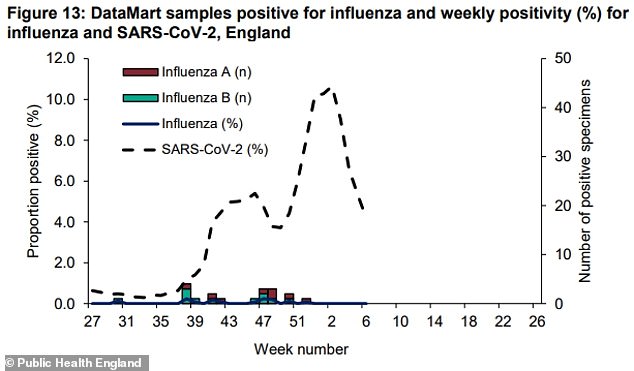Flu may have almost completely disappeared in England after brutal lockdown curbs thwarted the spread of the virus.
Public Health England has not recorded a single case of the virus so far this year through routine surveillance tests, despite it being the height of the usual flu season.
But this doesn’t mean it has been completely wiped out, health bosses say.
Yet officials are confident flu is barely spreading because only four people admitted to hospitals in England since the start of year were confirmed to have had the virus.
For comparison, 74 patients were admitted with flu during the same week at the start of 2020 — before Covid had taken hold.
However, the figures suggesting flu has been annihilated are from a snapshot of just 25 NHS trusts. Data for the other 100-plus hospitals are not included in the weekly surveillance reports.
Dr Vanessa Saliba, of PHE, said social distancing, face coverings and hand washing had sparked the sharp drop in influenza infections.
‘The decrease in flu cases this year is likely due to changes in our behaviour, such as social distancing, face coverings and handwashing, as well as the reduction in international travel,’ she told the Independent.
Some critics claim flu cases haven’t vanished at all but are instead being recorded as Covid because they both have similar symptoms.
Sceptics say tests are unable to distinguish between coronavirus and flu — but scientists insist there is no chance of mistaking one for the other through routine swabs.
But it was revealed at the start of the pandemic that some care home deaths were being blamed on Covid, even if the victim had not tested positive.

Public Health England was yet to record a single case of influenza this year by February 14. But experts cautioned this doesn’t mean the virus has completely disappeared, because the agency only sequences samples that it receives from NHS hospitals and as part of surveillance programmes
The lack of cases recorded through the official swabbing scheme by February 14 does not necessarily mean influenza is not in circulation.
PHE usually only checks samples sent to it by the NHS, which was overwhelmed with Covid patients.
The Office for National Statistics has also continued to record deaths linked to the virus this year.
PHE detects flu cases in hospitals by screening swab tests from NHS patients so doctors can better treat them if they know they have flu.
BRITONS COULD GET COVID VACCINE IN A PILL, SAYS EXPERT
Britons could get their Covid vaccine in the form of a pill in the future, according to the lead scientist behind Oxford University’s jab.
Professor Sarah Gilbert told MPs today her team were focusing their efforts on new, injection-free ways to deliver the vaccine and stimulate a better immune response.
The group are exploring delivering the jab using nasal sprays, in the same way the flu jab is given to children, or in tablet form, used in polio vaccination.
Not only would it be great news for people who have a fear of needles, it could help alleviate supply issues that have hindered rollouts internationally.
Professor Gilbert said using pills or nasal sprays may better target immune cells in the lungs, throat and nose, making them even more effective.
Advertisement
But it usually only carries this out for critically ill patients, and surveillance programmes examining the spread of the virus.
PHE admitted in its own report that all indicators show influenza is spreading at low levels but warned there is now ‘limited testing’ for viruses that aren’t Covid.
Dr Saliba added that cases were also low because of the flu vaccine – which more than 15million people in England got last year.
‘[This] helps protect them from the flu and also stops them spreading it to others,’ she said.
‘This season’s immunisation programme is on track to be the most successful ever, with the highest levels of vaccine uptake recorded for those 65 years and over, two and three-year-olds and healthcare workers.’
81 per cent of over-65s have had the vaccine this year, along with around half of high-risk younger people and pregnant women, and a third of middle-aged people who were in an expanded group for 2020.
Experts have said the sharp decline in flu infections suggests that the virus could be kept in check every year with some of the measures used to stop Covid, which may remain in use after the pandemic.
NHS hospitals usually see a mass influx of flu patients every winter, but this year they failed to materialise.
Lockdowns have been imposed to bring down Covid-19 cases in the community and relieve intense pressure on healthcare services.
Studies and official data show coronavirus is significantly deadlier than flu for older people, but may be similar for the young.
No10 is currently carrying out a mass vaccination programme against Covid to allow life to return to normal, with the aim of freedom by June 21.
Boris Johnson has outlined his ‘four-stage’ ticket to freedom from restrictions, saying this has only been made possible by immunity from jabs.
The plan will see schools be the first to open on March 8, followed by friends and families being allowed to meet with one other in parks on March 24.
Officials will wait five weeks between relaxing each level to ensure it does not trigger any spikes in Covid infections.
Source link : https://www.dailymail.co.uk/news/article-9295743/NO-cases-influenza-detected-England-year-social-distancing-measures.html











